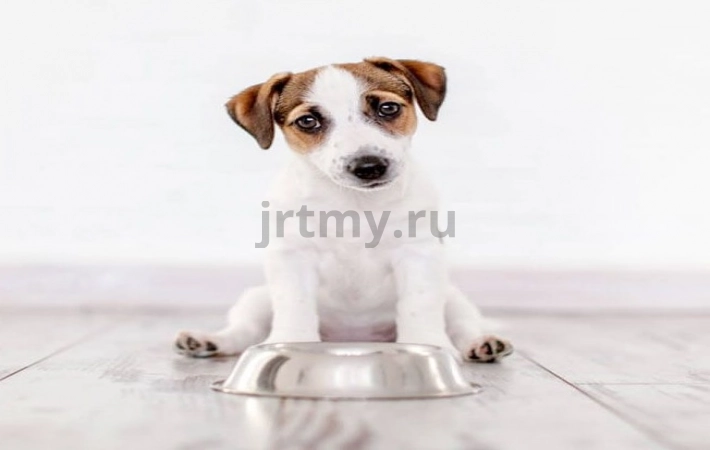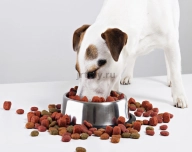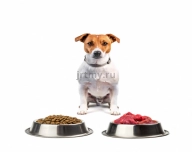Feeding a puppy
Feeding a puppy
For your little Jack to radiate health and cheerfulness, develop harmoniously, and have no health problems, you must take special care when it comes to feeding your puppy.

Growth is the most important period of a puppy's life when bone and muscle mass are being formed and all systems of the body are being built properly.
The growing body needs more energy per kilogram of body weight than the adult dog. The need for protein, vitamins and various minerals is also much higher. Protein deficiencies during growth can lead to anemia, changes in the constitution, and developmental delays. Lack of calcium and phosphorus in the diet leads to disruption of bone formation.
A complete food for a little Jack should include proteins, fats, carbohydrates, vitamins, trace elements, and minerals.
Be sure to find out from the breeder what food the puppy was fed, and continue to feed it the same food for at least 7-10 days. Next, you must decide for yourself whether you will feed your puppy natural food or prepared foods. Get your puppy used to the new food gradually. If you choose ready-made puppy food, it should be super-premium or premium puppy food for small breeds. There are plenty of choices at pet stores.
If you decide to feed your puppy natural foods, their composition should be diverse.
Meat - beef, turkey, chicken breast, Meat is better given in the raw form, as it is better digested and has a higher energy value than boiled (the meat should be frozen beforehand, and immediately before feeding, defrost, so that the puppy is not infected with worms). The meat should be cut into small pieces, but not turned into minced meat. In addition to protein, meat is rich in vitamin B, chlorides, and phosphates, which are very useful for the young body.
Fish - fish should be given only of marine origin, preferably pre-cooked. Fish, in addition to protein, contains vitamin A, iodine, and phosphorus. Fish need to alternate with meat and do not feed your puppy at the same time o6oyi products.
Milk is an excellent source of protein, as well as calcium and phosphorus. Milk contains lactose, however, and a puppy's young body can only digest a certain amount of lactose. If it is in excess, the puppy can get digestive distress. Therefore, you should not give too much milk. Instead of milk, it is better to give ten percent cream, diluted with water, they do not cause an upset. It is very useful to include cottage cheese made from milk by adding calcium chloride to the puppy's food. Cereals - corn, rice, wheat, oatmeal, buckwheat, are a source of carbohydrates and various vitamins. Give Jack well-cooked porridge in water with a mixture of meat or fish and grated vegetables.
Raw vegetables, fruits, and herbs are also healthy foods that contain, in addition to vitamins, fiber to help digest food. Give vegetables raw and grated. Although you can sometimes give him whole vegetables - chewing them on removes plaque from his teeth. Give your pet radishes, carrots, and apples to chew on.
These are basic foods that should include puppy food, you can't feed your puppy sweets or spicy food.
Proper nutrition is not only a diet but also a feeding regimen. Puppies 2-6 months old should be fed 4-5 times a day. From 6 months of age, move your puppy to 3 meals a day.
After one year of age, feed the dog 2 times a day, morning and evening.
When it's feeding time, but the food in a bowl and call for Jack. Place the bowl on a stand and give the puppy the "eat" command. If the puppy refuses food or doesn't finish his portion, put the food away, don't leave it in the bowl. Don't worry, the puppy won't go hungry or be hand-fed. He'll eat well the next time you feed him. Trust me, no puppy has ever starved himself.
Don't forget water: clean drinking water should always be in Jack's bowl.



